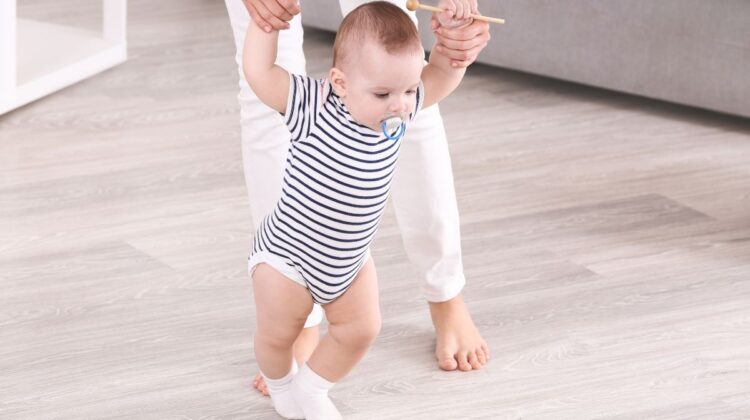
Supporting and encouraging your baby’s walking development is crucial for their overall motor development. The ability to walk opens up a world of exploration and independence for your little one. In this article, we will explore nine practical tips and activities that can stimulate and support your baby’s walking journey, ensuring they develop the necessary skills and confidence to take those first steps towards independence.
1. Create a Safe Environment
Clearing obstacles and ensuring a safe and open space for exploration is vital as your baby begins their walking journey. Remove any potential hazards or sharp objects from their path, and secure furniture to prevent accidents. Utilize baby gates to limit access to dangerous areas, while providing a stable and supportive surface for walking walking practice.
2. Encourage Tummy Time
Tummy time is not only essential for developing core muscles and coordination but also plays a role in preparing your baby for walking. Make tummy time enjoyable by using colorful toys and engaging activities that capture their attention. Gradually increase the duration of tummy time sessions to strengthen your baby’s muscles and promote overall motor development.
3. Promote Crawling and Creeping
Crawling and creeping are significant precursors to walking. Encourage your baby to move by placing enticing toys just out of reach, motivating them to explore their surroundings. Create crawling-friendly spaces by using cushions or tunnels to add an element of fun and challenge as they maneuver through different obstacles.
4. Offer Supportive Toys and Tools
Activity walkers or push toys can provide the necessary support and encourage balance as your baby begins to take their first steps. These toys allow them to push and hold on while practicing their walking skills. Additionally, ride-on toys or pushcars can help develop leg strength and coordination, preparing them for independent walking. Stacking blocks or nesting cups can also enhance fine motor skills and hand-eye coordination, which are essential for walking.
5. Engage in Assisted Walking

As your baby gains confidence, you can support their walking development by holding their hands and guiding them in walking motions. This assistance gives them a sense of security and balance as they practice taking steps. You can also use a sturdy push-wagon or walking assistant that provides additional support and stability. Gradually reduce the level of support as your baby becomes more comfortable and confident in their walking abilities.
6. Incorporate Balance and Coordination Exercises
Activities that focus on balance and coordination are beneficial for your baby’s walking development. Encourage them to sit on an exercise ball or wobble board, which helps improve their core strength and stability. Simple games like Simon Says can be an entertaining way to practice body control and coordination. Additionally, dancing or moving to music can enhance their balance and rhythm, preparing them for smoother steps.
7. Create an Obstacle Course
Setting up a mini obstacle course at home can be a fun and challenging way to support your baby’s walking journey. Use pillows, cushions, and tunnels to create a safe and exciting course for them to crawl, climb, and navigate through. Adjust the difficulty level as their skills progress, providing them with a sense of accomplishment and building their confidence.
8. Use Sensory Stimuli
Incorporating sensory experiences into your baby’s walking practice can further enhance their development. Encourage them to walk on different textures such as carpet, grass, or sand, stimulating their senses and providing a variety of sensory feedback. Introduce them to sensory toys or objects with different shapes, sizes, and textures, engaging their curiosity and fine-tuning their motor skills. Encouraging barefoot walking can also enhance their sensory feedback and balance.
9. Be Patient and Celebrate Milestones
Every baby develops at their own pace, so it’s important to be patient and supportive throughout their walking journey. Celebrate each milestone, no matter how small, such as standing independently or taking a few steps. Provide praise, encouragement, and support to build their confidence and motivate further progress. Remember that consistency, love, and a nurturing environment are key factors in their successful walking development.
Final Words
Incorporating these nine practical tips and activities into your baby’s daily routine can provide them with the support and stimulation they need for walking development. Remember to create a safe environment, engage in tummy time, promote crawling and creeping, offer supportive toys and tools, engage in assisted walking, incorporate balance and coordination exercises, create obstacle courses, use sensory stimuli, and be patient while celebrating milestones. Enjoy the journey of your baby’s walking development, and embrace the joy and excitement that comes with each step they take towards independence.